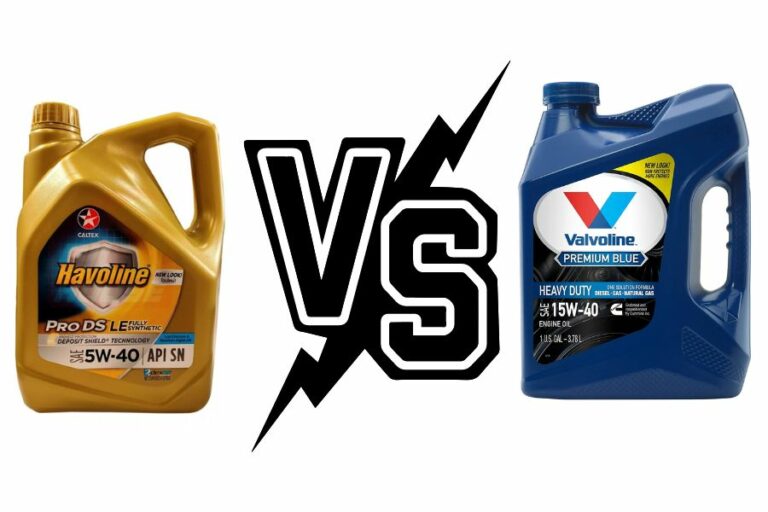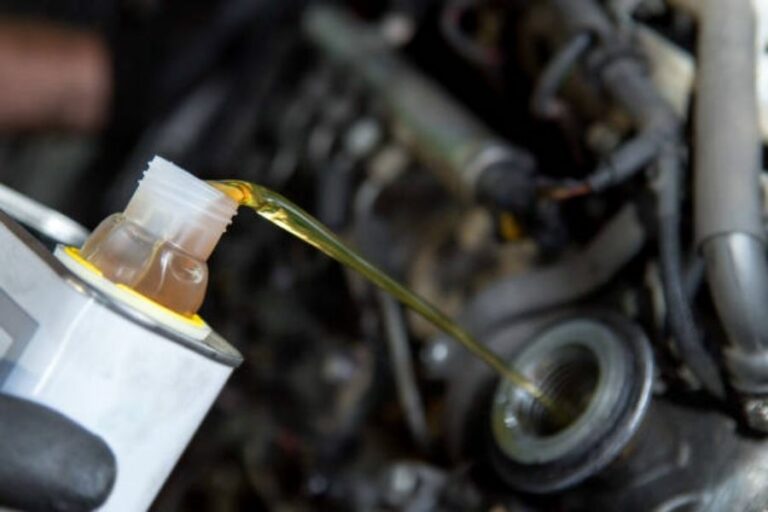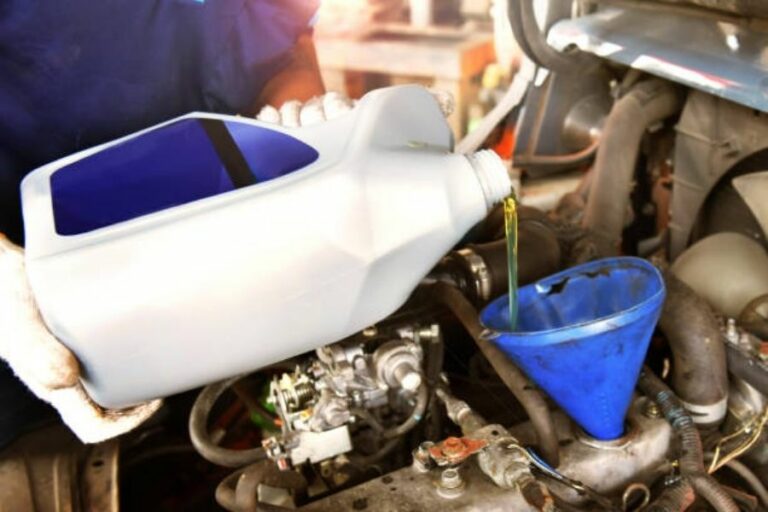0w40 vs 5w40: Which Synthetic Oil is Better for Your Car?
In this article, I am going to go give you a complete guideline of engine oils. I am also going to discuss features and compare both the 0w40 and 5w40 engine oils. Furthermore, you will also learn some techniques for choosing the right engine oil.
Our main discourse in this article is going to be two full synthetic oils that are very good for use in both winter and summer. Both are good choices to use around the year as they both produce good performances in winter and summer.
Differences between 0w40 vs 5w40
| Comparison Parameters | 0w40 | 5w40 |
| Kinematic viscosity[mm2/s] | 12.9 at 100 degree celsius 71.0 at 40 degree celsius | 14.443 at 100 degree celsius 90.903 at 40 degree celsius |
| Viscosity Index | 185 | 176 |
| Low Shear Rate Viscosity | 12.5 to 16.3 mm2/s at 100g | |
| High Shear Rate Viscosity | 3.5 at 150g | |
| Temperature Range | -40°C to +40°C | -35°C to +40°C |
| Density[g/cm3] | 0.855 at 15ºC | 0.860 at 15°C |
| Price | Comparatively expensive | Comparatively cheaper |
| Thickness | Comparatively less thick | Thicker |
| Oil Flow | Better flow at extreme cold temperatures | The flow at extreme cold is not as good as 0w40 |
Kinematic Viscosity: From the above table we can see that the Kinematic Viscosity of 5w40 is significantly higher than 0w40. That means the internal resistance for the flow of 0w40 under gravitational forces is less than 5w40, which makes the 0w40 to have a better flow than 5w40.
Viscosity Index: The viscosity index is however less in 5w40 than 0w40 oil. That means 0w40 oil’s viscosity changes more than 5w40 under any change of temperatures.
Temperature Range: The temperature range of 0w40 is -40°C to +40°C. On the other hand, the temperature range for 5w40 is -35°C to +40°C. From this, we can see that 0w40 is a bit more effective in extreme cold weather regions.
Density: From their density at 15 degree celsius, we can see that there’s not much difference in them in terms of density.
Price: 0w40 engine oils are comparatively cheaper than 5w40. Although, the difference is not much. So, if your vehicle’s manual recommends a specific one between them, do not hesitate to go for it.
Thickness: The 5w40 is comparatively thicker than the 0w40 as can be seen from the kinematic viscosity. And also the fact that the viscosity index is higher for 5w40 indicates the thickness for 5w40 oil.
Oil Flow: The 0w40 because of its higher viscosity index gets thinner as the temperature falls, therefore having a better flow at extreme cold temperatures compared to 5w40.
Features of SAE 5w40 Oil
- Gives you high oxidation stability
- Advanced cleaning properties
- Least contamination of engine
- Convenient to start at low temperatures
- Gives you good detergent properties
- Oil film stability
- Considerable increase in replacement interval
- Longer life span due to the properties of antioxidant
- When power unit is started in cold temperature, it reduces frictions
- Engine wear is lessened
Features of SAE 0w40 Oil
- Best in fuel economy
- No fuel change is needed
- Highest engine protection is ensured
- Superior drain intervals
- Reduced friction
- Natural viscosity index is very high
- Evaporation is less compared to other synthetic oils
- No existence of unnecessary additives that reduce the process of lubrication
- High resistance to oxidations
Is it OK to use 0W40 instead of 5W40?
Yes, it is fine to use 0w40 instead of 5w40 oil as both of them have equal high-temperature resistance. However, if your area has milder winters, then it’s better not to go for 0w40 instead of 5w40 engine oils.
However, the 0w40 oils, because of their higher viscosity index may as well be thinner at the time of startup. There’s a chance of insufficient engine protection because of this.
What does 0w40 engine oil mean?
0w40 is a full synthetic advanced engine oil. It has been made for the latest engine that uses diesel and gasoline technology.
The full form of 0w40 engine oil is SAE 0w40. Here, SAE stands for “Society of Automotive Engineering” and it is a global organization for engineers working in different industries and sectors.
In the name “0w40”, the two numbers before and after the “w” references the viscosity of the oil in low and high temperatures respectively. So, the viscosity grade of this type of engine oil at low temperatures is 0 and its viscosity at operating temperature is 40. Finally, the “w” in “0w40” denotes “winter”.
0w40 oil will reduce its viscosity in cold temperatures. Therefore, there will be no trouble in starting the engine of a car in extreme winter. And when the engine starts operating, it increases its viscosity to maintain the fluidity.
What does 5w40 engine oil mean?
As discussed above, the numbers before and after denotes the low and high viscosity of this engine oil type. The “w” as always, stands for “Winter”.
This specific type of engines operating temperatures range from -35 degrees celsius (-31 Fahrenheit) to +40 degree celsius (104 fahrenheit). SAE 5w40 is also a full synthetic oil.
Synthetic, semi-synthetic, and mineral car engine oils
Usually, all types of engine oils are composed of 75-85% base oils and 15-25% additives. Base oils mainly perform the task of lubrication while additives are used for performance improvements. Based on the composition, i.e., the processing method and raw materials that are used, there are three types of car engine oils. They are: Synthetic, semi-synthetic, and mineral car engine oils.
Mineral engine oils:
Mineral engine oils are natural oils that are extracted from crude petroleum. The crude petroleum then goes through several refining processes for purification. Mineral engine oils are mainly composed of hydrocarbons.
Synthetic engine oils:
Synthetic engine oils are extracted chemically using a chemical process called synthesis. Refined petroleum can also be a source of synthetic oils. Refining synthetic oils is a complex and expensive process. Only the best molecules are left after refining, therefore the best quality is ensured.
Different additives are also mixed with the base oil. Synthetic engine oils guarantee the best performance and quality among the three types of oils based on composition.
Semi-synthetic engine oils:
Semi-synthetic oils are a mixture of mineral oils and synthetic oils. The mixture proportion in semi-synthetic oils is not equal. A maximum of 30% synthetic oil is mixed in semi-synthetic oil.
Why is Thickness Important?
The motor oil flows through the engine system of your vehicle and its parts for lubricating them. They also protect your engine from dust and contaminants that harm your engine. After moving through the engine system, the motor oil must return to the oil pan after the engine is turned off.
Viscosity is the most important trait to measure an engine oil. In simple words, viscosity refers to how thick your engine oil is.
An engine oil must perform in different weathers. It should flow properly in the cold and also should maintain enough thickness to protect the engine in the heat of summer. Therefore, the high and low viscosity grade or thickness in your engine oil is of paramount importance.
If your engine oil is too thick in cold temperatures, then you will have troubles with starting your vehicle. On the other hand, if your engine becomes too thin in the presence of heat, then it will not be able to lubricate the engine parts and protect the engine components from wearing and tearing.
Many have used thicker engine oils for their cars. A thicker engine well may help to fill the gap when the clearance between engine components increases or becomes sloppy. A few have even used thicker oils for their leaky engines so that the oil doesn’t spill.
However, when the engine you use is so thick that it actually has a higher viscosity than your car’s manufacturer’s recommendation, then it’s harmful.
Single Grade vs. Multigrade Oil
All engine oils regardless of their composition, are classified according to their viscosity. Viscosity in easier terms can be described as a property that describes how fast the oil will flow through the motor at the engine’s operating temperature.
Polymer additives or viscosity index improvers are not used in a single-grade oil. A total of 11 single-grade oils exist at present.
On the other hand, multi-grade oils use viscosity index improver and are processed in a way so that they have two different flows. One for the time when the engine is cold and another when the engine is hot or warm.
Multi-grade oils are denoted by a “w” in their name, which stands for “Winter”.
Check Answer: can I use 5w40 instead of 15w40?
15w40 vs 10w30-What happens if I use 15W40 instead of 5w30?
Will Synthetic Oil Quite Noisy Lifters
Check Difference Between 5w30 and 5w40. And Can I use 75W140 instead of 75W90?
How to pick the right engine oil
Picking the right engine oil for your car can be tricky. With so many options in the market, it gets even trickier. Therefore, here are some basic instructions for making your decisions easier while picking the engine oil.
The first and foremost step is a pretty basic one – checking your car’s manual. The manufacturer of your car will recommend the weight of engine oil like a 5w40 and such.. The numbers denote the viscosity. For regular use in a moderate temperature, buying the recommended engine oil in the manual works is absolutely fine.
Secondly, if you are driving your vehicle in both extreme winter and summer, pay close attention to the viscosity number denoted on the name of the oil. Choose an oil that has high and low viscosity and therefore, two different flows in winter and summer.https://www.youtube.com/embed/Q_P34IyhhYY
The first number in an oil’s name refers to its low viscosity and the second refers to the high viscosity. So, look for higher viscosity if you’re running your vehicle in extreme heat and lower viscosity if your car will be running in winter.
Choose a range according to the weather conditions you will run your vehicle in.
Thirdly, when you visit an auto part’s store, you will see that oils are labelled according to their specific purpose of use such as new cars, higher-mileage vehicles, high-tech engines, and so on.
Choose accordingly by taking help from your car’s manual about the engine type and also your purpose of driving.
Choosing between Synthetic and Conventional Motor Oil
Premium Conventional Oil:
This is the oil to choose for a standard new car. All top brands have made these oils available in market in different viscosities.
Full Synthetic Oil:
These are oils that are made for heavy-duty uses or engines that are high-tech.
Synthetic Blend Oil:
These kind oils have organic oil mixed with synthetic oil. These are the perfect oils for using in cars that have heavier engine loads and used in high temperatures.
Higher Mileage Oil:
If you want to run your car’s mileage deep into the six figures, higher mileage oils are the best choice for you.
Frequently Asked Questions
What is 0W 40 oil used for?
0w40 oil is used for modern vehicles that use diesel and gasoline engines. It’s very suitable to use in areas where both extreme winter and summer hits at different times of the year.
What oil is equivalent to 0W40?
The closest thing to 0w40 oil is 5w30 oil.
Is 0W40 better than 5W30?
Yes. 0w40 is better than 5w30 for various reasons such as performance in extreme winter, fuel economy and so on. Also, unlike 5w30, there is no need to change the fuel if you use 0w40.
Is 0W40 better than 5W40?
Both 5w40 and 0w40 are great options in areas where both the warm summer and cold winter season hit. However, for areas where extreme winter is seen, 0w40 is a better choice because of its higher low-temperature resistance.
Is 0W oil better than 5W?
Yes. The 0w oils provide better fuel economy than 5w grade oils. Also, 0w oils provide faster oil flow through your engine because of their lower viscosity grade at time of engine starting.
Is 0W40 good for winter?
0w40 is extremely suitable for use in extreme cold winter to moderate winter. Because of their superior low-temperature range and lower viscosity, 0w40 provides real convenience in the winter season. The lower viscosity grade means 0w40 gives you far superior protection and better oil flow in cold weather.
Is 0W40 good for summer?
Yes. 0w40 oils are perfectly fine choices for summer. However, thicker oils such as 5w40 oils will give you better performance in heat as they will maintain their viscosity in a better way.
Conclusion
To conclude, both 0w40 and 5w40 oils are great choices for your vehicle if your car manufacturer recommends both. They are both suited for winter and summer, However, because of their different characteristics and low temperature range differences, it is better to use 0w40 in areas where extreme winter is common.
0w40 along with its superior fuel economy in all conditions, will give you better flow to start your engine without any breaking down in extremely cold weather.
The oil lubrication system is a vital feature of all combustion engines. This lubrication system carries out various functions such as lubrication, cooling, cleaning and also protects the engine from wearing out.






